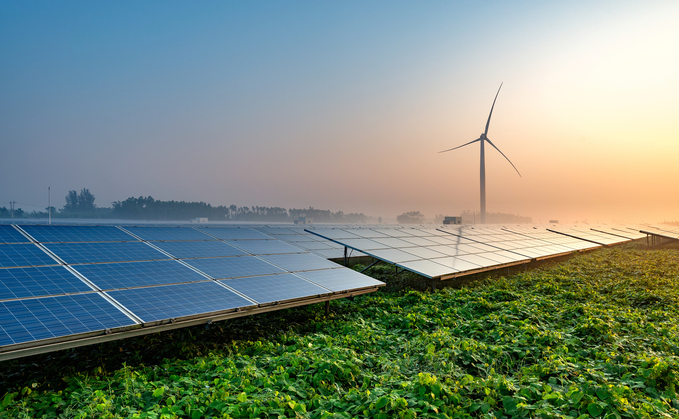
Regardless of whether or not climate targets are met, global industries are being changed beyond recognition - political and business leaders need to recognise business as usual is not an option
One of the biggest challenges faced by businesses trying to navigate the net zero transition is the extent to which so much of the discourse surrounding this grand industrial revolution is defined by a battle between two maximalist positions. So many of the debates and so much of the modelling is based on an assumption that we will either deliver near complete decarbonisation by 2050, or we will soldier on with business as usual until the point at which it gets so hot that business, and everything else, becomes distressingly unusual.
This dichotomy is hard to break, not least because it suits both climate hawks and climate sceptics alike.
From the climate hawk perspective, the focus simply has to remain on net zero emissions by 2050 at the absolute latest. As temperatures the world over smash records this summer, death rates spike, and agricultural yields plummet, the implications of more than 1.5C of warming from a humanitarian and security perspective, let alone an economic one, become painfully apparent.
Advocating for a more incrementalist approach to decarbonisation in this context is to tacitly admit that the 1.5C target is dead, the Paris Agreement's 'well below' 2C goal is on life support, and the world is heading for a very dangerous place. It risks positioning policies and investments that would result in still disastrous levels of warming as a win, on the grounds they are marginally better than business as usual. More broadly, if the mission is to avert the worst of the climate crisis it makes no sense to deploy emissions targets, technologies, and theories of change that demonstrably fail to achieve that goal.
Hence, we should just stop new oil and gas projects, electrify everything, and halve emissions inside seven years. This is entirely as it should be and completely the right level of ambition. It is much too late for incrementalism. As those hemp-loving hippies at the Office for Budgetary Responsibility argued again last week, the status quo is now much riskier and likely to prove much more expensive than efforts to rapidly decarboninse.
However, the focus on a maximalist approach to decarbonisation comes from net zero's detractors as much as its supporters. For critics of climate policies - be they fossil fuel vested interests, trade unions genuinely concerned about employment in carbon intensive industries, or reactionary climate sceptics - scare stories about the impacts of decarbonisation have considerably more edge if the talk is of all petrol cars being banned or gas boilers being ripped out. It is much easier to question plans to decarbonise the grid if the focus is on the long term effort to close the last fossil gas plant, rather than the near term and entirely feasible push to massively expand renewables capacity.
Meanwhile, opponents of net zero essentially advocate for a perpetual continuation of business as usual, as they attack even the most modest of decarbonisation measures and refuse to come forward with anything approximating a credible alternative decarbonisation strategy of their own. It is an approach the government itself is far too willing to countenance, combining its attacks on Just Stop Oil's sensible calls for an end to fossil fuel licenses with a complete failure to explain precisely how new fossil fuel infrastructure is to be made compatible with climate goals.
But what this dichotomy between a somewhat utopian net zero scenario and a recklessly dystopian opposition to anything that challenges business as usual risks missing is the most likely outcome: a messy mix somewhere between these two ends of the decarbonisation spectrum.
Such a scenario could easily be interpreted as a failure for climate hawks, and it is true that it would come with worsening climate impacts. But it also points to how a net zero emission economy might yet be achieved, perhaps even by mid-century.
To illustrate this slightly counter-intuitive argument, consider last week's striking report from think tank RMI and its analysis suggesting near exponential renewable energy deployment rates mean the global power sector is actually on track to meet net zero goals. It is an inspiring vision, but it is easy to be sceptical at the idea renewables deployment is on an S-curve that will inevitably result in a four-fold increase in wind and solar generation inside just seven years. What of planning constraints? What of supply chain bottlenecks? What of the constant risk of political backlash?
Such concerns are entirely justified, but here's the thing: even if these hugely optimistic projections are only half right, they still point to a global energy system transformed beyond recognition.
I hope this doesn't happen, but the clean energy transition can miss all its hugely stretching goals for 2030 and renewables would still be the backbone of the global power system, electric vehicles would still be the default transport choice, green industrial projects would still be up and running, and, crucially, fossil fuel demand would still be falling off a cliff.
This would absolutely not - and I cannot stress this enough - be a best case scenario. This is not the pace of clean tech deployment, nor the rate of decarbonisation we should be aspiring too. It would likely result in over 2C of warming and the myriad catastrophes that would come with it (as an aside, it remains bizarre that much of the analysis of future climate impacts focuses so much on 1.5C, 2C or 4C of warming and not the 2.5-3C range that we are currently on track for - businesses could do with those forecasts). It would necessitate carbon removals on a credulity-stretching scale, if the climate were to be stabilised in the coming decades.
But what far too many political leaders, businesses, and investors fail to comprehend is that the choice here is not between net zero and the business as usual offered by the fossil fuel incumbency. Even many of the oil and gas industry's cheerleaders accept it is on the way out, the only question is how fast. The uncertainty surrounds whether we deliver on our necessarily stretching climate goals or fall agonisingly short. That latter scenario comes with terrifying climate impacts, but it still entails rapid technological change and significant economic gains alongside the hugely increased risks of the climatic tipping points that could spell catastrophe.
And as that rapid change builds momentum it will serve to push down the cost of clean technologies, demonstrate the benefits of decarbonisation to the public, and gradually bring the full net zero goal within reach. For example, it may be technically challenging to deliver a 100 per cent decarbonised grid, but as countries such as Portugal and Denmark and increasingly the UK have demonstrated, we know how to run grids where renewables dominate. There is a lot of headroom to deploy clean technologies at scale all around the world before we get anywhere close to the technical and supply chain risks cited daily by opponents of the net zero transition. In the meantime, work is advancing every day to overcome the technical and financial barriers to a fully decarbonised economy.
This is the context for the CBI's first public intervention under its new leadership yesterday, as it warned the government was at risk of squandering a £57bn green growth opportunity. The best businesses increasingly understand that from a planning, investment, and competitiveness perspective it is useful to have net zero as a 'north star' to work towards. But in the near to medium term the clean tech revolution is happening regardless and they urgently need to respond. The transition may not be happening fast enough, but it is still reshaping entire markets and it is getting faster all the time.
It is debatable as to whether 1.5C is still alive or not, but business as usual is definitely dead.
A version of this article first appeared as part of BusinessGreen's Overnight Briefing email, which is available to all BusinessGreen Intelligence members.










